Knowledge Management Report: MITS5505, June 2019, University Report
VerifiedAdded on 2022/10/09
|7
|2147
|25
Report
AI Summary
This report examines the critical role of knowledge management in modern business environments, emphasizing its significance as a key asset for organizational performance. The paper focuses on a meta-review article by Mohammad Asrar-Ul-Haq and Sadia Anwar, which explores elements contributing to effective knowledge sharing and management. The report reviews various factors discussed in the article, including the impact of organizational culture, trust, and rewards on knowledge sharing. It highlights the importance of information sharing, organizational policy, and collaboration, while also addressing challenges faced by developing countries. The research methodology involves a meta-examination of peer-reviewed journals to identify trends, issues, and obstacles related to knowledge exchange and dissemination. The report concludes by emphasizing the importance of knowledge management in organizational success and suggests areas for future research, such as exploring these issues in developing countries and further examining the relationship between knowledge sharing and social media.
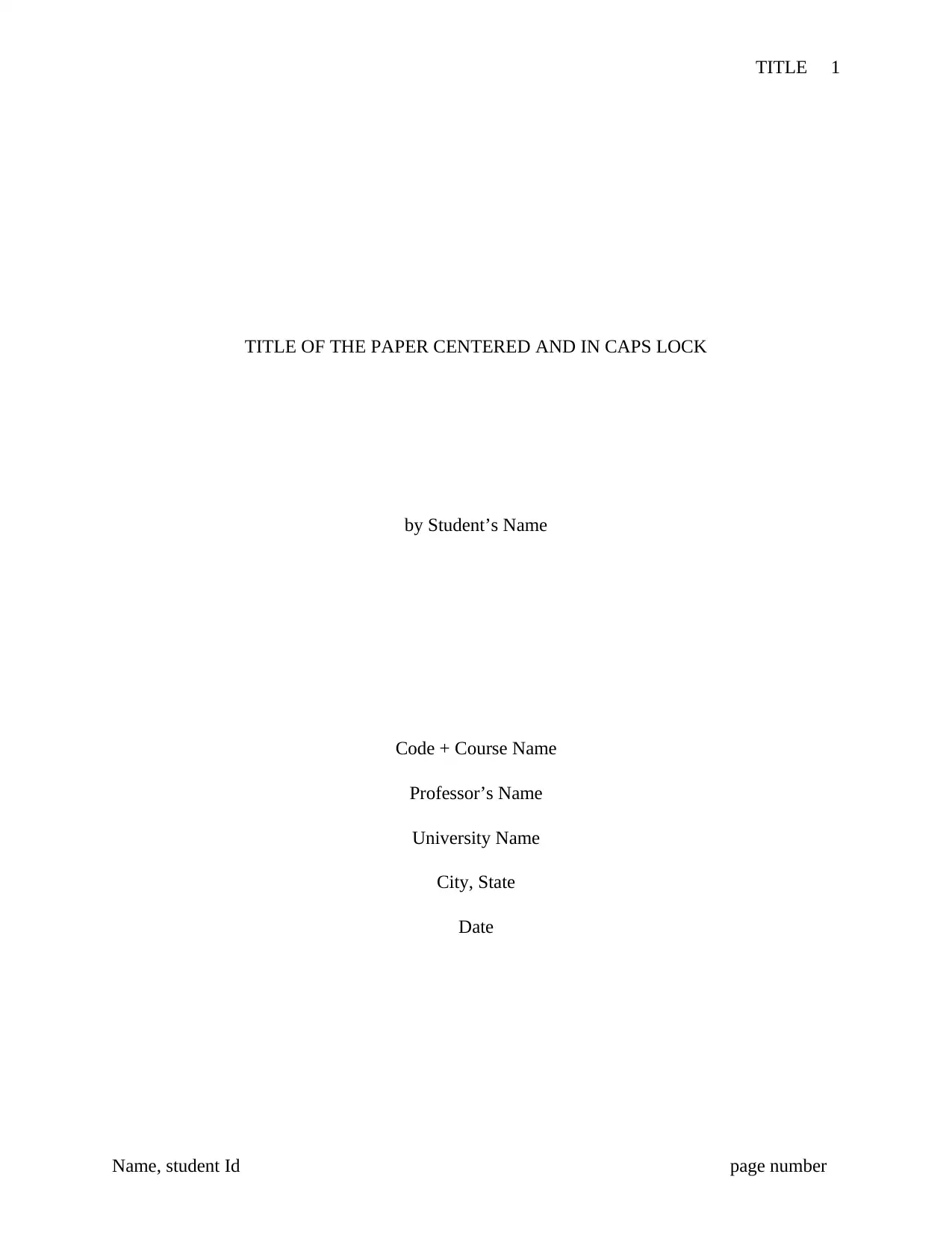
TITLE 1
TITLE OF THE PAPER CENTERED AND IN CAPS LOCK
by Student’s Name
Code + Course Name
Professor’s Name
University Name
City, State
Date
Name, student Id page number
TITLE OF THE PAPER CENTERED AND IN CAPS LOCK
by Student’s Name
Code + Course Name
Professor’s Name
University Name
City, State
Date
Name, student Id page number
Paraphrase This Document
Need a fresh take? Get an instant paraphrase of this document with our AI Paraphraser
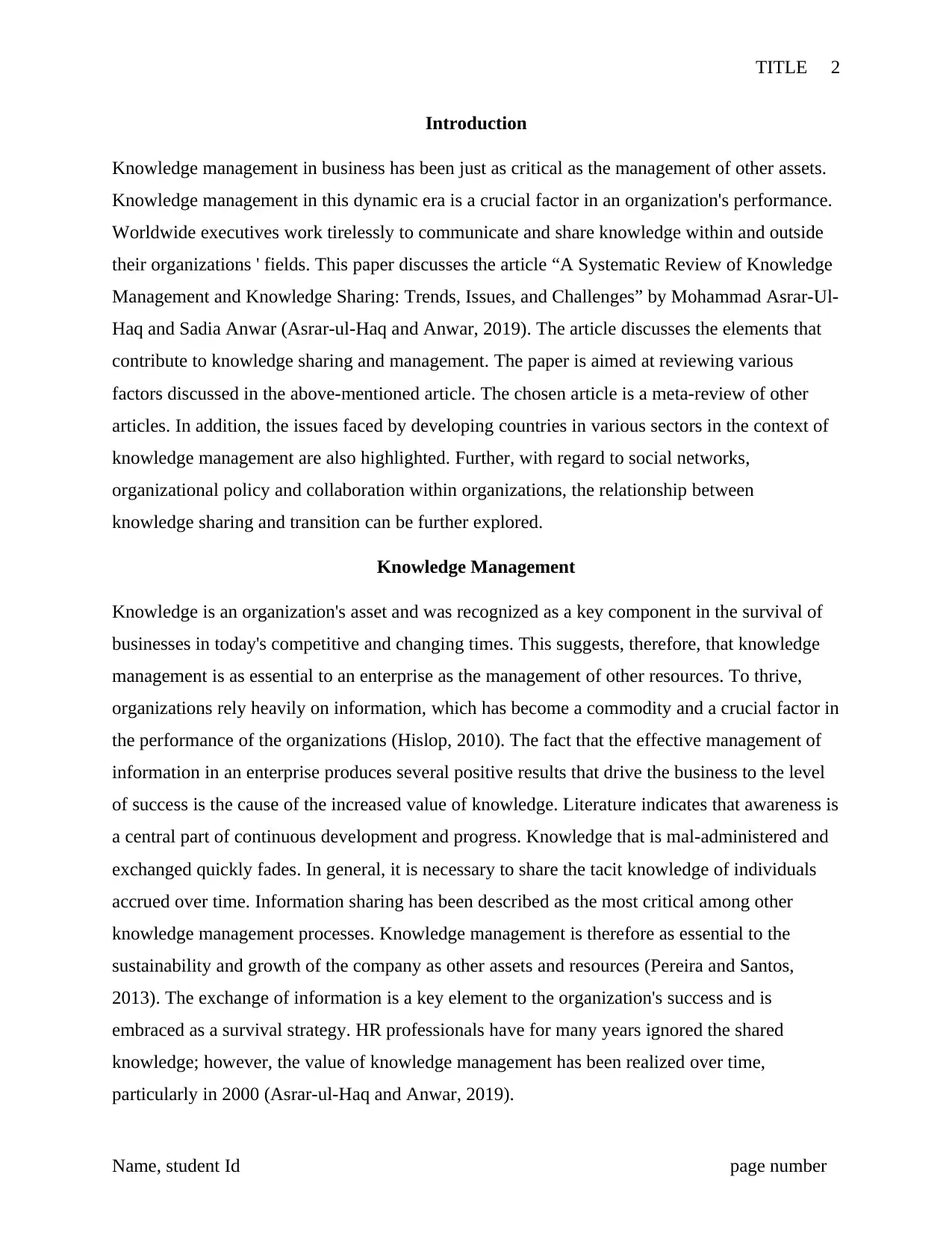
TITLE 2
Introduction
Knowledge management in business has been just as critical as the management of other assets.
Knowledge management in this dynamic era is a crucial factor in an organization's performance.
Worldwide executives work tirelessly to communicate and share knowledge within and outside
their organizations ' fields. This paper discusses the article “A Systematic Review of Knowledge
Management and Knowledge Sharing: Trends, Issues, and Challenges” by Mohammad Asrar-Ul-
Haq and Sadia Anwar (Asrar-ul-Haq and Anwar, 2019). The article discusses the elements that
contribute to knowledge sharing and management. The paper is aimed at reviewing various
factors discussed in the above-mentioned article. The chosen article is a meta-review of other
articles. In addition, the issues faced by developing countries in various sectors in the context of
knowledge management are also highlighted. Further, with regard to social networks,
organizational policy and collaboration within organizations, the relationship between
knowledge sharing and transition can be further explored.
Knowledge Management
Knowledge is an organization's asset and was recognized as a key component in the survival of
businesses in today's competitive and changing times. This suggests, therefore, that knowledge
management is as essential to an enterprise as the management of other resources. To thrive,
organizations rely heavily on information, which has become a commodity and a crucial factor in
the performance of the organizations (Hislop, 2010). The fact that the effective management of
information in an enterprise produces several positive results that drive the business to the level
of success is the cause of the increased value of knowledge. Literature indicates that awareness is
a central part of continuous development and progress. Knowledge that is mal-administered and
exchanged quickly fades. In general, it is necessary to share the tacit knowledge of individuals
accrued over time. Information sharing has been described as the most critical among other
knowledge management processes. Knowledge management is therefore as essential to the
sustainability and growth of the company as other assets and resources (Pereira and Santos,
2013). The exchange of information is a key element to the organization's success and is
embraced as a survival strategy. HR professionals have for many years ignored the shared
knowledge; however, the value of knowledge management has been realized over time,
particularly in 2000 (Asrar-ul-Haq and Anwar, 2019).
Name, student Id page number
Introduction
Knowledge management in business has been just as critical as the management of other assets.
Knowledge management in this dynamic era is a crucial factor in an organization's performance.
Worldwide executives work tirelessly to communicate and share knowledge within and outside
their organizations ' fields. This paper discusses the article “A Systematic Review of Knowledge
Management and Knowledge Sharing: Trends, Issues, and Challenges” by Mohammad Asrar-Ul-
Haq and Sadia Anwar (Asrar-ul-Haq and Anwar, 2019). The article discusses the elements that
contribute to knowledge sharing and management. The paper is aimed at reviewing various
factors discussed in the above-mentioned article. The chosen article is a meta-review of other
articles. In addition, the issues faced by developing countries in various sectors in the context of
knowledge management are also highlighted. Further, with regard to social networks,
organizational policy and collaboration within organizations, the relationship between
knowledge sharing and transition can be further explored.
Knowledge Management
Knowledge is an organization's asset and was recognized as a key component in the survival of
businesses in today's competitive and changing times. This suggests, therefore, that knowledge
management is as essential to an enterprise as the management of other resources. To thrive,
organizations rely heavily on information, which has become a commodity and a crucial factor in
the performance of the organizations (Hislop, 2010). The fact that the effective management of
information in an enterprise produces several positive results that drive the business to the level
of success is the cause of the increased value of knowledge. Literature indicates that awareness is
a central part of continuous development and progress. Knowledge that is mal-administered and
exchanged quickly fades. In general, it is necessary to share the tacit knowledge of individuals
accrued over time. Information sharing has been described as the most critical among other
knowledge management processes. Knowledge management is therefore as essential to the
sustainability and growth of the company as other assets and resources (Pereira and Santos,
2013). The exchange of information is a key element to the organization's success and is
embraced as a survival strategy. HR professionals have for many years ignored the shared
knowledge; however, the value of knowledge management has been realized over time,
particularly in 2000 (Asrar-ul-Haq and Anwar, 2019).
Name, student Id page number
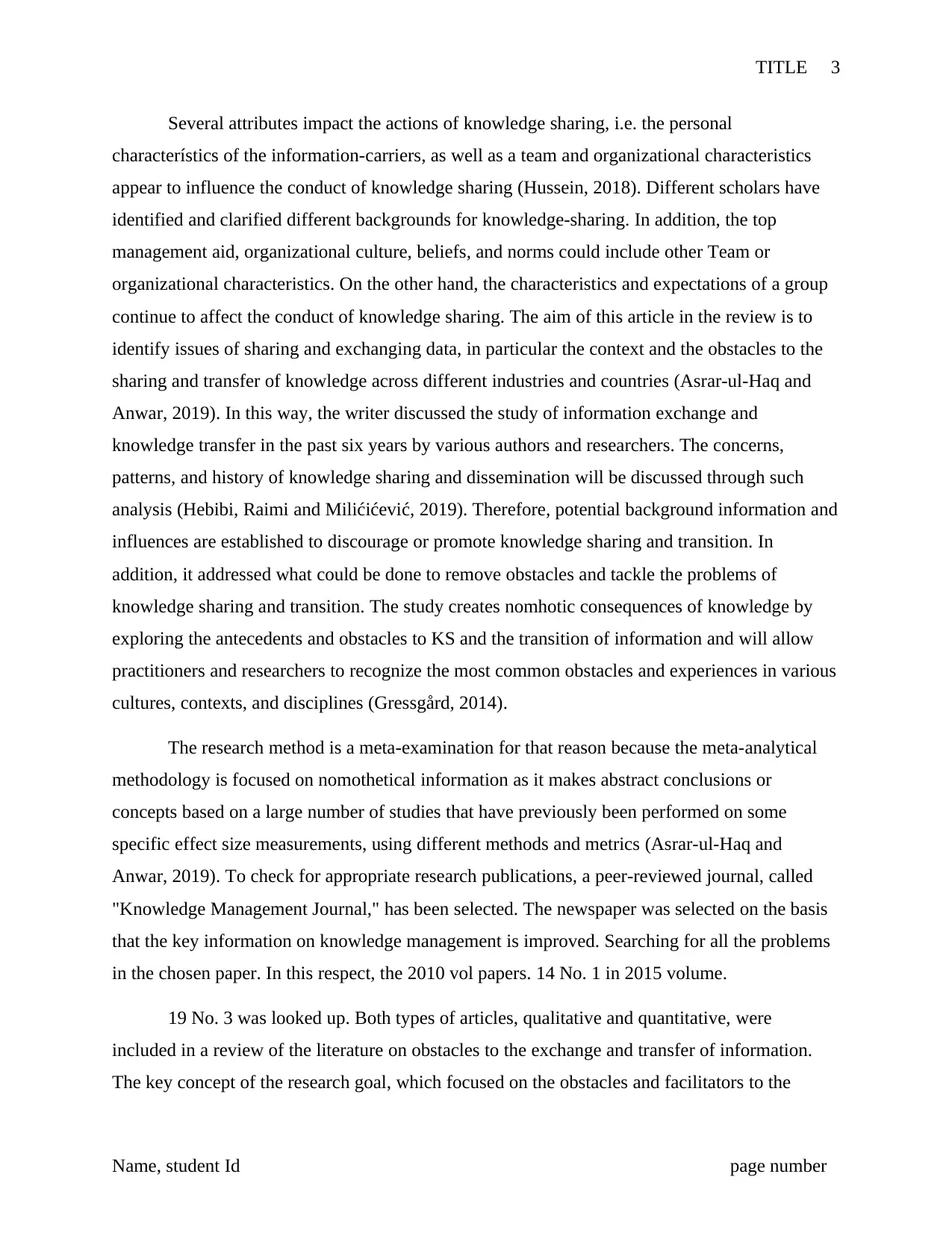
TITLE 3
Several attributes impact the actions of knowledge sharing, i.e. the personal
characterístics of the information-carriers, as well as a team and organizational characteristics
appear to influence the conduct of knowledge sharing (Hussein, 2018). Different scholars have
identified and clarified different backgrounds for knowledge-sharing. In addition, the top
management aid, organizational culture, beliefs, and norms could include other Team or
organizational characteristics. On the other hand, the characteristics and expectations of a group
continue to affect the conduct of knowledge sharing. The aim of this article in the review is to
identify issues of sharing and exchanging data, in particular the context and the obstacles to the
sharing and transfer of knowledge across different industries and countries (Asrar-ul-Haq and
Anwar, 2019). In this way, the writer discussed the study of information exchange and
knowledge transfer in the past six years by various authors and researchers. The concerns,
patterns, and history of knowledge sharing and dissemination will be discussed through such
analysis (Hebibi, Raimi and Milićićević, 2019). Therefore, potential background information and
influences are established to discourage or promote knowledge sharing and transition. In
addition, it addressed what could be done to remove obstacles and tackle the problems of
knowledge sharing and transition. The study creates nomhotic consequences of knowledge by
exploring the antecedents and obstacles to KS and the transition of information and will allow
practitioners and researchers to recognize the most common obstacles and experiences in various
cultures, contexts, and disciplines (Gressgård, 2014).
The research method is a meta-examination for that reason because the meta-analytical
methodology is focused on nomothetical information as it makes abstract conclusions or
concepts based on a large number of studies that have previously been performed on some
specific effect size measurements, using different methods and metrics (Asrar-ul-Haq and
Anwar, 2019). To check for appropriate research publications, a peer-reviewed journal, called
"Knowledge Management Journal," has been selected. The newspaper was selected on the basis
that the key information on knowledge management is improved. Searching for all the problems
in the chosen paper. In this respect, the 2010 vol papers. 14 No. 1 in 2015 volume.
19 No. 3 was looked up. Both types of articles, qualitative and quantitative, were
included in a review of the literature on obstacles to the exchange and transfer of information.
The key concept of the research goal, which focused on the obstacles and facilitators to the
Name, student Id page number
Several attributes impact the actions of knowledge sharing, i.e. the personal
characterístics of the information-carriers, as well as a team and organizational characteristics
appear to influence the conduct of knowledge sharing (Hussein, 2018). Different scholars have
identified and clarified different backgrounds for knowledge-sharing. In addition, the top
management aid, organizational culture, beliefs, and norms could include other Team or
organizational characteristics. On the other hand, the characteristics and expectations of a group
continue to affect the conduct of knowledge sharing. The aim of this article in the review is to
identify issues of sharing and exchanging data, in particular the context and the obstacles to the
sharing and transfer of knowledge across different industries and countries (Asrar-ul-Haq and
Anwar, 2019). In this way, the writer discussed the study of information exchange and
knowledge transfer in the past six years by various authors and researchers. The concerns,
patterns, and history of knowledge sharing and dissemination will be discussed through such
analysis (Hebibi, Raimi and Milićićević, 2019). Therefore, potential background information and
influences are established to discourage or promote knowledge sharing and transition. In
addition, it addressed what could be done to remove obstacles and tackle the problems of
knowledge sharing and transition. The study creates nomhotic consequences of knowledge by
exploring the antecedents and obstacles to KS and the transition of information and will allow
practitioners and researchers to recognize the most common obstacles and experiences in various
cultures, contexts, and disciplines (Gressgård, 2014).
The research method is a meta-examination for that reason because the meta-analytical
methodology is focused on nomothetical information as it makes abstract conclusions or
concepts based on a large number of studies that have previously been performed on some
specific effect size measurements, using different methods and metrics (Asrar-ul-Haq and
Anwar, 2019). To check for appropriate research publications, a peer-reviewed journal, called
"Knowledge Management Journal," has been selected. The newspaper was selected on the basis
that the key information on knowledge management is improved. Searching for all the problems
in the chosen paper. In this respect, the 2010 vol papers. 14 No. 1 in 2015 volume.
19 No. 3 was looked up. Both types of articles, qualitative and quantitative, were
included in a review of the literature on obstacles to the exchange and transfer of information.
The key concept of the research goal, which focused on the obstacles and facilitators to the
Name, student Id page number
⊘ This is a preview!⊘
Do you want full access?
Subscribe today to unlock all pages.

Trusted by 1+ million students worldwide
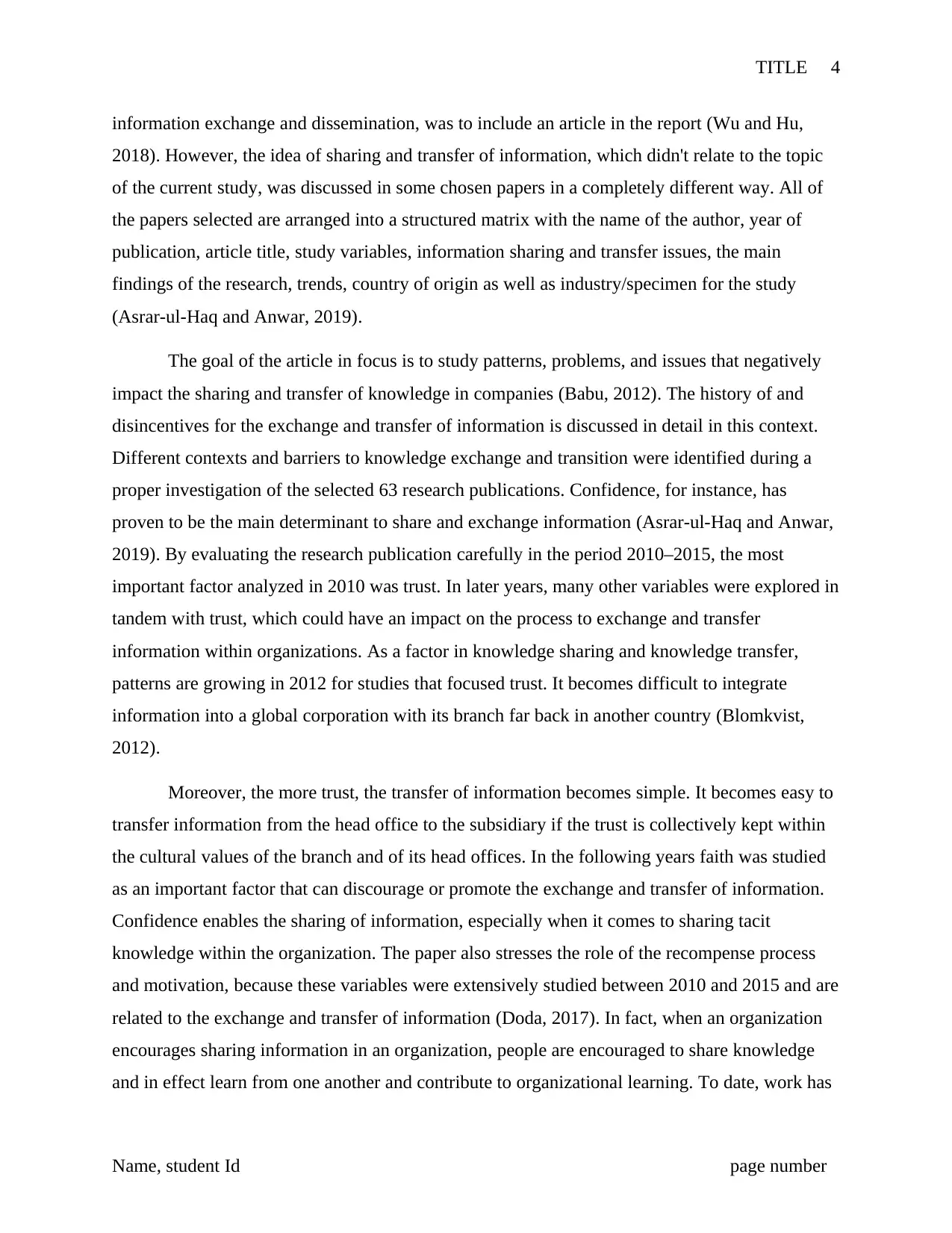
TITLE 4
information exchange and dissemination, was to include an article in the report (Wu and Hu,
2018). However, the idea of sharing and transfer of information, which didn't relate to the topic
of the current study, was discussed in some chosen papers in a completely different way. All of
the papers selected are arranged into a structured matrix with the name of the author, year of
publication, article title, study variables, information sharing and transfer issues, the main
findings of the research, trends, country of origin as well as industry/specimen for the study
(Asrar-ul-Haq and Anwar, 2019).
The goal of the article in focus is to study patterns, problems, and issues that negatively
impact the sharing and transfer of knowledge in companies (Babu, 2012). The history of and
disincentives for the exchange and transfer of information is discussed in detail in this context.
Different contexts and barriers to knowledge exchange and transition were identified during a
proper investigation of the selected 63 research publications. Confidence, for instance, has
proven to be the main determinant to share and exchange information (Asrar-ul-Haq and Anwar,
2019). By evaluating the research publication carefully in the period 2010–2015, the most
important factor analyzed in 2010 was trust. In later years, many other variables were explored in
tandem with trust, which could have an impact on the process to exchange and transfer
information within organizations. As a factor in knowledge sharing and knowledge transfer,
patterns are growing in 2012 for studies that focused trust. It becomes difficult to integrate
information into a global corporation with its branch far back in another country (Blomkvist,
2012).
Moreover, the more trust, the transfer of information becomes simple. It becomes easy to
transfer information from the head office to the subsidiary if the trust is collectively kept within
the cultural values of the branch and of its head offices. In the following years faith was studied
as an important factor that can discourage or promote the exchange and transfer of information.
Confidence enables the sharing of information, especially when it comes to sharing tacit
knowledge within the organization. The paper also stresses the role of the recompense process
and motivation, because these variables were extensively studied between 2010 and 2015 and are
related to the exchange and transfer of information (Doda, 2017). In fact, when an organization
encourages sharing information in an organization, people are encouraged to share knowledge
and in effect learn from one another and contribute to organizational learning. To date, work has
Name, student Id page number
information exchange and dissemination, was to include an article in the report (Wu and Hu,
2018). However, the idea of sharing and transfer of information, which didn't relate to the topic
of the current study, was discussed in some chosen papers in a completely different way. All of
the papers selected are arranged into a structured matrix with the name of the author, year of
publication, article title, study variables, information sharing and transfer issues, the main
findings of the research, trends, country of origin as well as industry/specimen for the study
(Asrar-ul-Haq and Anwar, 2019).
The goal of the article in focus is to study patterns, problems, and issues that negatively
impact the sharing and transfer of knowledge in companies (Babu, 2012). The history of and
disincentives for the exchange and transfer of information is discussed in detail in this context.
Different contexts and barriers to knowledge exchange and transition were identified during a
proper investigation of the selected 63 research publications. Confidence, for instance, has
proven to be the main determinant to share and exchange information (Asrar-ul-Haq and Anwar,
2019). By evaluating the research publication carefully in the period 2010–2015, the most
important factor analyzed in 2010 was trust. In later years, many other variables were explored in
tandem with trust, which could have an impact on the process to exchange and transfer
information within organizations. As a factor in knowledge sharing and knowledge transfer,
patterns are growing in 2012 for studies that focused trust. It becomes difficult to integrate
information into a global corporation with its branch far back in another country (Blomkvist,
2012).
Moreover, the more trust, the transfer of information becomes simple. It becomes easy to
transfer information from the head office to the subsidiary if the trust is collectively kept within
the cultural values of the branch and of its head offices. In the following years faith was studied
as an important factor that can discourage or promote the exchange and transfer of information.
Confidence enables the sharing of information, especially when it comes to sharing tacit
knowledge within the organization. The paper also stresses the role of the recompense process
and motivation, because these variables were extensively studied between 2010 and 2015 and are
related to the exchange and transfer of information (Doda, 2017). In fact, when an organization
encourages sharing information in an organization, people are encouraged to share knowledge
and in effect learn from one another and contribute to organizational learning. To date, work has
Name, student Id page number
Paraphrase This Document
Need a fresh take? Get an instant paraphrase of this document with our AI Paraphraser
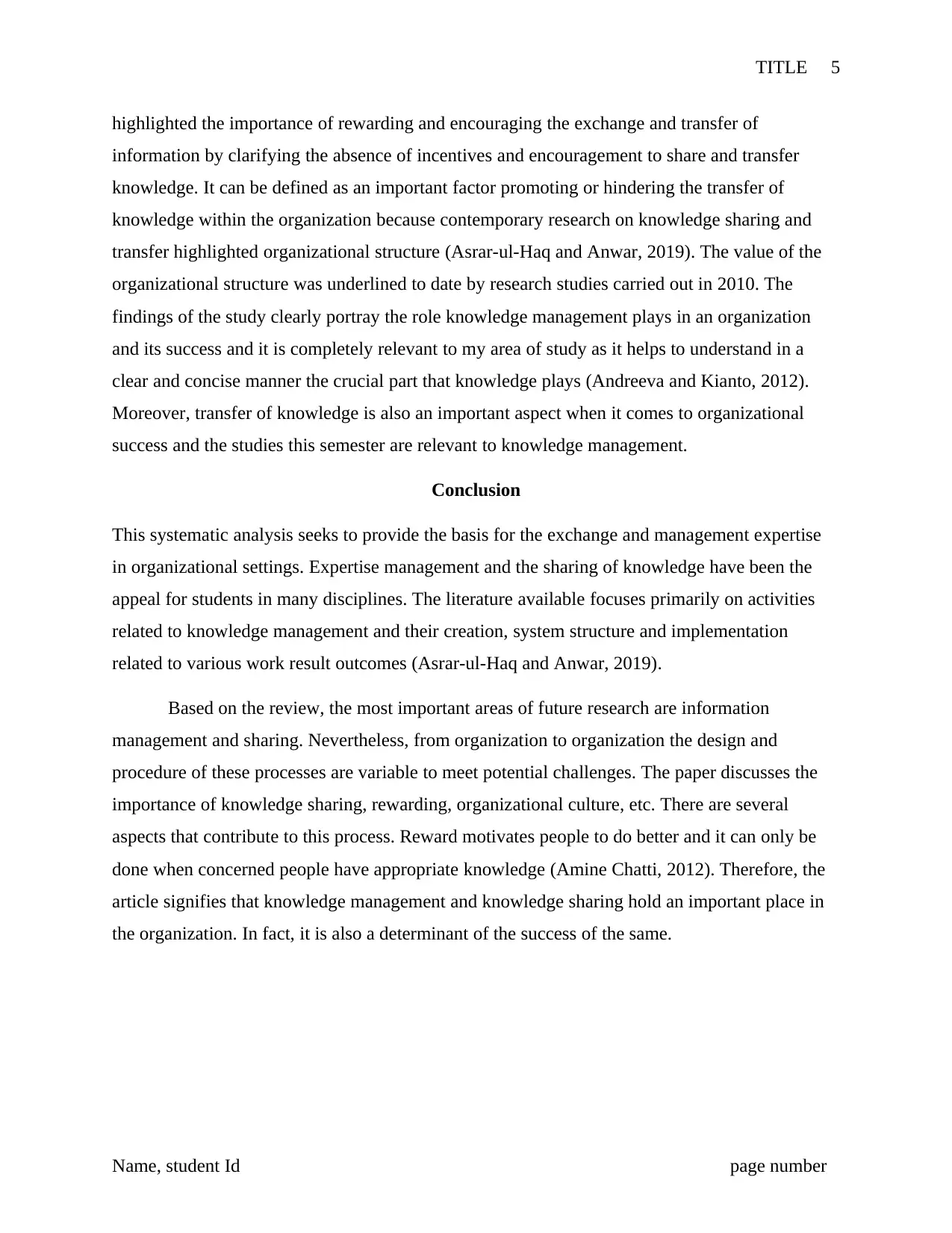
TITLE 5
highlighted the importance of rewarding and encouraging the exchange and transfer of
information by clarifying the absence of incentives and encouragement to share and transfer
knowledge. It can be defined as an important factor promoting or hindering the transfer of
knowledge within the organization because contemporary research on knowledge sharing and
transfer highlighted organizational structure (Asrar-ul-Haq and Anwar, 2019). The value of the
organizational structure was underlined to date by research studies carried out in 2010. The
findings of the study clearly portray the role knowledge management plays in an organization
and its success and it is completely relevant to my area of study as it helps to understand in a
clear and concise manner the crucial part that knowledge plays (Andreeva and Kianto, 2012).
Moreover, transfer of knowledge is also an important aspect when it comes to organizational
success and the studies this semester are relevant to knowledge management.
Conclusion
This systematic analysis seeks to provide the basis for the exchange and management expertise
in organizational settings. Expertise management and the sharing of knowledge have been the
appeal for students in many disciplines. The literature available focuses primarily on activities
related to knowledge management and their creation, system structure and implementation
related to various work result outcomes (Asrar-ul-Haq and Anwar, 2019).
Based on the review, the most important areas of future research are information
management and sharing. Nevertheless, from organization to organization the design and
procedure of these processes are variable to meet potential challenges. The paper discusses the
importance of knowledge sharing, rewarding, organizational culture, etc. There are several
aspects that contribute to this process. Reward motivates people to do better and it can only be
done when concerned people have appropriate knowledge (Amine Chatti, 2012). Therefore, the
article signifies that knowledge management and knowledge sharing hold an important place in
the organization. In fact, it is also a determinant of the success of the same.
Name, student Id page number
highlighted the importance of rewarding and encouraging the exchange and transfer of
information by clarifying the absence of incentives and encouragement to share and transfer
knowledge. It can be defined as an important factor promoting or hindering the transfer of
knowledge within the organization because contemporary research on knowledge sharing and
transfer highlighted organizational structure (Asrar-ul-Haq and Anwar, 2019). The value of the
organizational structure was underlined to date by research studies carried out in 2010. The
findings of the study clearly portray the role knowledge management plays in an organization
and its success and it is completely relevant to my area of study as it helps to understand in a
clear and concise manner the crucial part that knowledge plays (Andreeva and Kianto, 2012).
Moreover, transfer of knowledge is also an important aspect when it comes to organizational
success and the studies this semester are relevant to knowledge management.
Conclusion
This systematic analysis seeks to provide the basis for the exchange and management expertise
in organizational settings. Expertise management and the sharing of knowledge have been the
appeal for students in many disciplines. The literature available focuses primarily on activities
related to knowledge management and their creation, system structure and implementation
related to various work result outcomes (Asrar-ul-Haq and Anwar, 2019).
Based on the review, the most important areas of future research are information
management and sharing. Nevertheless, from organization to organization the design and
procedure of these processes are variable to meet potential challenges. The paper discusses the
importance of knowledge sharing, rewarding, organizational culture, etc. There are several
aspects that contribute to this process. Reward motivates people to do better and it can only be
done when concerned people have appropriate knowledge (Amine Chatti, 2012). Therefore, the
article signifies that knowledge management and knowledge sharing hold an important place in
the organization. In fact, it is also a determinant of the success of the same.
Name, student Id page number
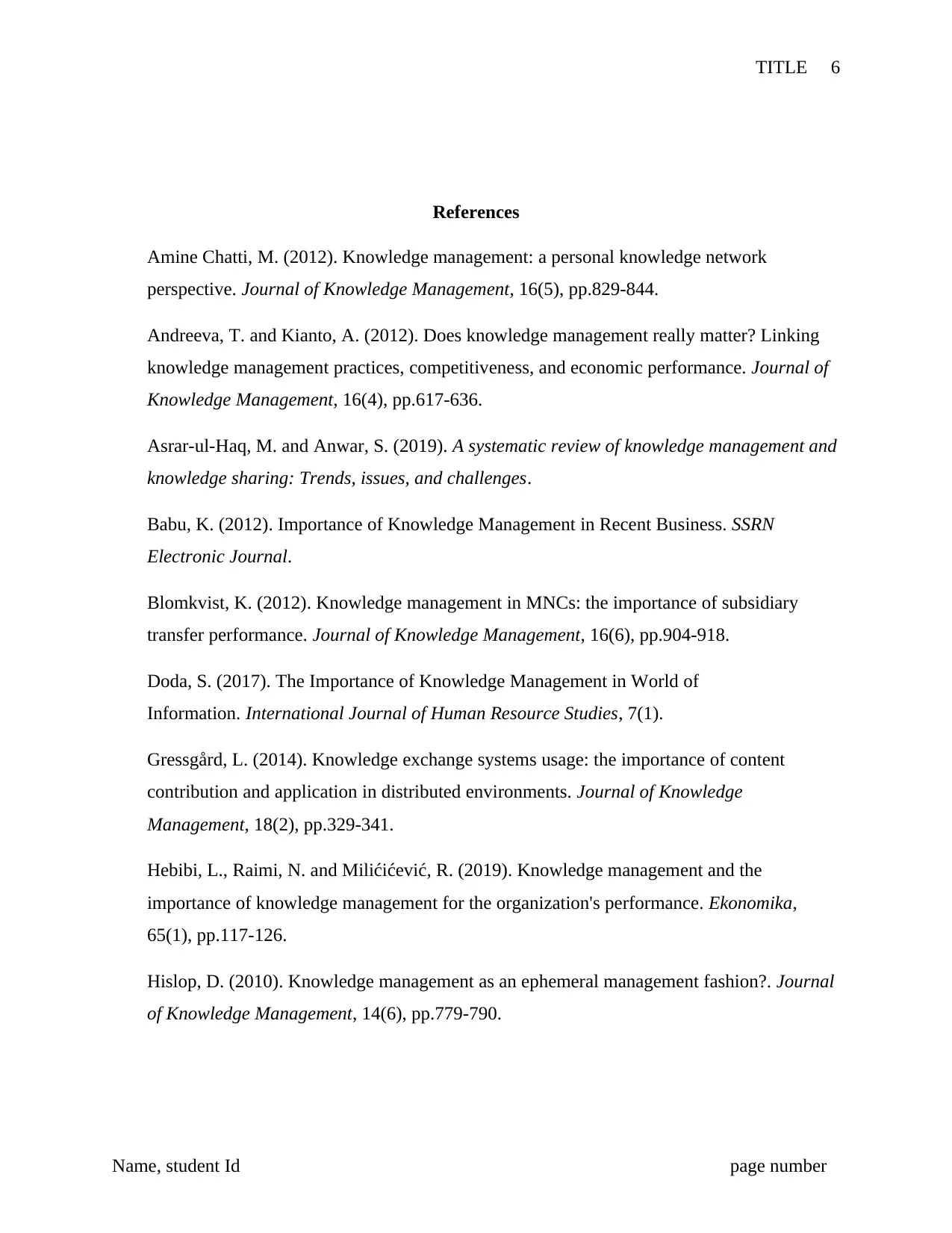
TITLE 6
References
Amine Chatti, M. (2012). Knowledge management: a personal knowledge network
perspective. Journal of Knowledge Management, 16(5), pp.829-844.
Andreeva, T. and Kianto, A. (2012). Does knowledge management really matter? Linking
knowledge management practices, competitiveness, and economic performance. Journal of
Knowledge Management, 16(4), pp.617-636.
Asrar-ul-Haq, M. and Anwar, S. (2019). A systematic review of knowledge management and
knowledge sharing: Trends, issues, and challenges.
Babu, K. (2012). Importance of Knowledge Management in Recent Business. SSRN
Electronic Journal.
Blomkvist, K. (2012). Knowledge management in MNCs: the importance of subsidiary
transfer performance. Journal of Knowledge Management, 16(6), pp.904-918.
Doda, S. (2017). The Importance of Knowledge Management in World of
Information. International Journal of Human Resource Studies, 7(1).
Gressgård, L. (2014). Knowledge exchange systems usage: the importance of content
contribution and application in distributed environments. Journal of Knowledge
Management, 18(2), pp.329-341.
Hebibi, L., Raimi, N. and Milićićević, R. (2019). Knowledge management and the
importance of knowledge management for the organization's performance. Ekonomika,
65(1), pp.117-126.
Hislop, D. (2010). Knowledge management as an ephemeral management fashion?. Journal
of Knowledge Management, 14(6), pp.779-790.
Name, student Id page number
References
Amine Chatti, M. (2012). Knowledge management: a personal knowledge network
perspective. Journal of Knowledge Management, 16(5), pp.829-844.
Andreeva, T. and Kianto, A. (2012). Does knowledge management really matter? Linking
knowledge management practices, competitiveness, and economic performance. Journal of
Knowledge Management, 16(4), pp.617-636.
Asrar-ul-Haq, M. and Anwar, S. (2019). A systematic review of knowledge management and
knowledge sharing: Trends, issues, and challenges.
Babu, K. (2012). Importance of Knowledge Management in Recent Business. SSRN
Electronic Journal.
Blomkvist, K. (2012). Knowledge management in MNCs: the importance of subsidiary
transfer performance. Journal of Knowledge Management, 16(6), pp.904-918.
Doda, S. (2017). The Importance of Knowledge Management in World of
Information. International Journal of Human Resource Studies, 7(1).
Gressgård, L. (2014). Knowledge exchange systems usage: the importance of content
contribution and application in distributed environments. Journal of Knowledge
Management, 18(2), pp.329-341.
Hebibi, L., Raimi, N. and Milićićević, R. (2019). Knowledge management and the
importance of knowledge management for the organization's performance. Ekonomika,
65(1), pp.117-126.
Hislop, D. (2010). Knowledge management as an ephemeral management fashion?. Journal
of Knowledge Management, 14(6), pp.779-790.
Name, student Id page number
⊘ This is a preview!⊘
Do you want full access?
Subscribe today to unlock all pages.

Trusted by 1+ million students worldwide
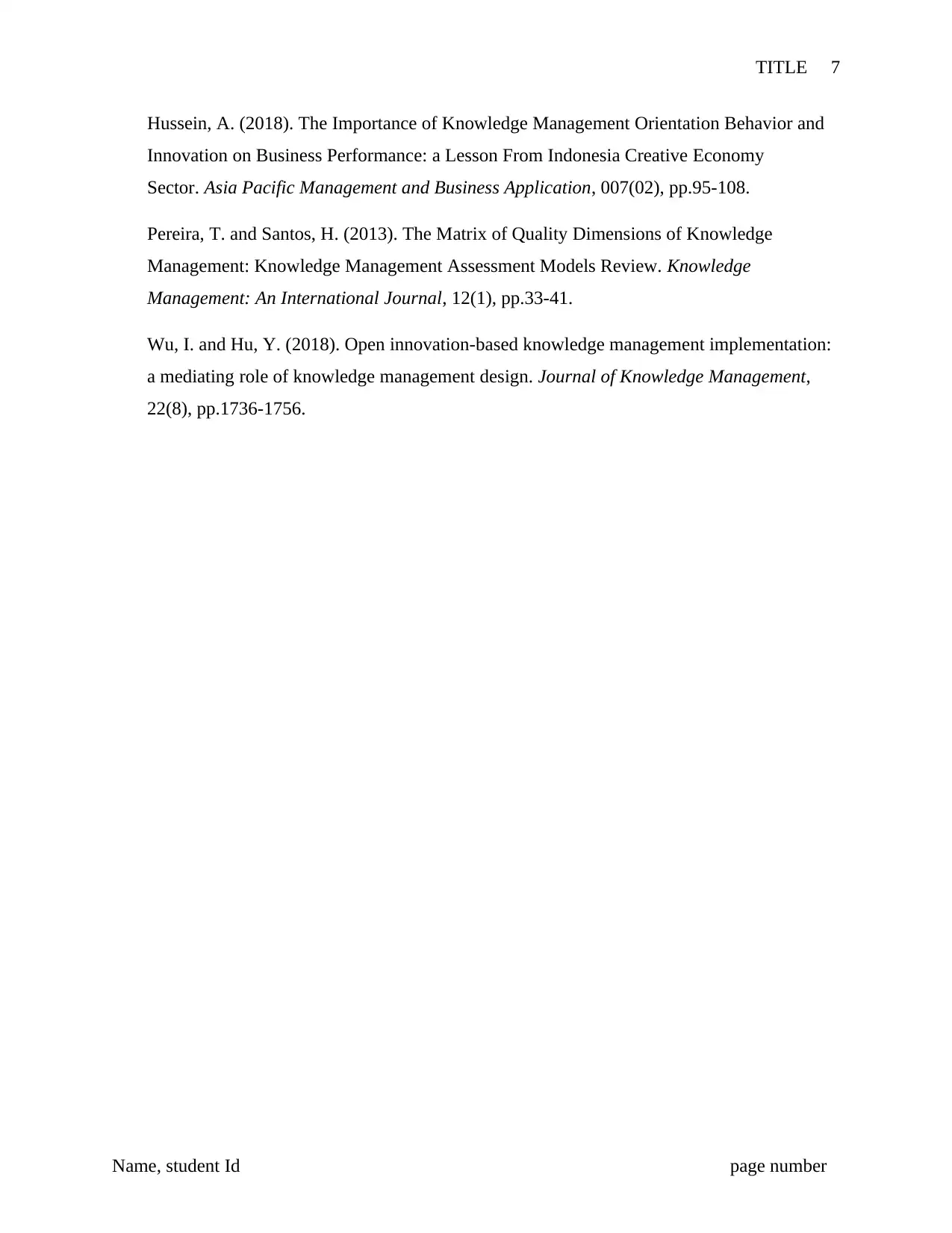
TITLE 7
Hussein, A. (2018). The Importance of Knowledge Management Orientation Behavior and
Innovation on Business Performance: a Lesson From Indonesia Creative Economy
Sector. Asia Pacific Management and Business Application, 007(02), pp.95-108.
Pereira, T. and Santos, H. (2013). The Matrix of Quality Dimensions of Knowledge
Management: Knowledge Management Assessment Models Review. Knowledge
Management: An International Journal, 12(1), pp.33-41.
Wu, I. and Hu, Y. (2018). Open innovation-based knowledge management implementation:
a mediating role of knowledge management design. Journal of Knowledge Management,
22(8), pp.1736-1756.
Name, student Id page number
Hussein, A. (2018). The Importance of Knowledge Management Orientation Behavior and
Innovation on Business Performance: a Lesson From Indonesia Creative Economy
Sector. Asia Pacific Management and Business Application, 007(02), pp.95-108.
Pereira, T. and Santos, H. (2013). The Matrix of Quality Dimensions of Knowledge
Management: Knowledge Management Assessment Models Review. Knowledge
Management: An International Journal, 12(1), pp.33-41.
Wu, I. and Hu, Y. (2018). Open innovation-based knowledge management implementation:
a mediating role of knowledge management design. Journal of Knowledge Management,
22(8), pp.1736-1756.
Name, student Id page number
1 out of 7
Related Documents
Your All-in-One AI-Powered Toolkit for Academic Success.
+13062052269
info@desklib.com
Available 24*7 on WhatsApp / Email
![[object Object]](/_next/static/media/star-bottom.7253800d.svg)
Unlock your academic potential
Copyright © 2020–2026 A2Z Services. All Rights Reserved. Developed and managed by ZUCOL.





